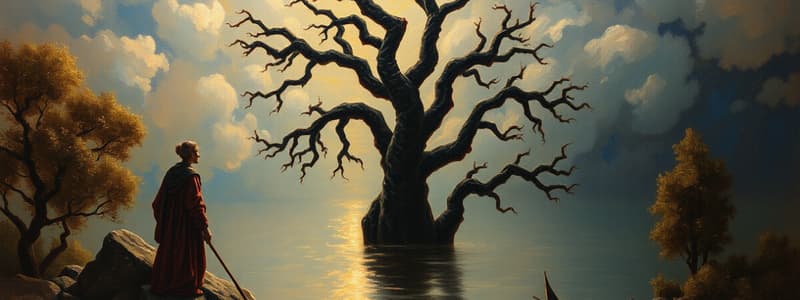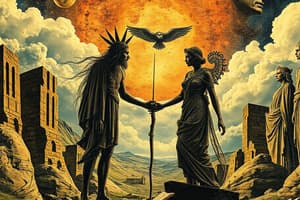Podcast
Questions and Answers
What does water commonly symbolize in creation stories?
What does water commonly symbolize in creation stories?
- Stability and fertility
- Eternal knowledge and divinity
- The administrative order of the universe
- Chaos and the primordial state before creation (correct)
Which duality is commonly highlighted in many creation stories?
Which duality is commonly highlighted in many creation stories?
- Life vs. Death
- Fame vs. Obscurity
- Order vs. Chaos (correct)
- Mortality vs. Immortality
In many creation narratives, what role does humanity often symbolize?
In many creation narratives, what role does humanity often symbolize?
- The inevitability of chaos
- The destructive nature of the universe
- The relationship between humans and the divine (correct)
- The isolation of individual existence
What is emphasized by many cultures to illustrate the significance of nature in creation stories?
What is emphasized by many cultures to illustrate the significance of nature in creation stories?
How do different cultures typically express symbolic themes in creation stories?
How do different cultures typically express symbolic themes in creation stories?
Flashcards are hidden until you start studying
Study Notes
Symbolism In Creation
-
Mythical Representation: Creation stories often symbolize the beginning of the world, explaining existence through mythology.
-
Elements of Nature:
- Water: Often symbolizes chaos and the primordial state before creation.
- Light: Represents knowledge, divinity, and the dispelling of darkness (ignorance).
- Earth: Symbolizes stability, fertility, and the nurturing aspect of creation.
-
Dualities: Many creation stories highlight dualities, such as:
- Order vs. Chaos: Reflects the transition from a chaotic void to an orderly universe.
- Good vs. Evil: Introduces moral dimensions, often through the actions of deities.
-
Divine Intervention:
- Gods/Goddesses: Often symbolize creative power, embodying specific aspects like wisdom, strength, or love.
- Creatures: Symbolize various traits or forces in the world, such as chaos (serpents) or guidance (birds).
-
Cyclical Nature: Many cultures view creation as a cycle, symbolizing renewal and continuity (e.g., seasons, life cycles).
-
Humanity's Role:
- Often symbolizes the relationship between humans and the divine, representing stewardship over creation.
- Reflects themes of responsibility, purpose, and the quest for understanding one's place in the universe.
-
Cultural Variations: Different cultures express similar symbolic themes through unique narratives, reflecting local beliefs and values.
-
Sacredness of Creation: Emphasizes the significance of nature, often leading to reverence for the environment and creation itself.
Mythical Representation
- Creation stories depict the origin of the universe, using mythology to explain existence.
Elements of Nature
- Water symbolizes chaos and represents the primordial state preceding creation.
- Light signifies knowledge and divinity, illuminating the path out of darkness and ignorance.
- Earth embodies stability, fertility, and the nurturing characteristics essential to creation.
Dualities
- Creation narratives frequently feature the duality of Order vs. Chaos, illustrating the shift from a formless void to an organized universe.
- The Good vs. Evil dichotomy introduces moral elements, often depicted through the deeds of various deities.
Divine Intervention
- Gods and Goddesses often represent creative powers, each reflecting distinct attributes such as wisdom, strength, or love.
- Various creatures symbolize different traits or forces, like chaos represented by serpents or guidance depicted by birds.
Cyclical Nature
- Many cultures view creation as a cycle, reflecting concepts of renewal and continuity through phenomena like seasons and life cycles.
Humanity's Role
- Humanity often symbolizes the relationship with the divine, embodying stewardship of creation while highlighting themes of responsibility and the search for meaning in the universe.
Cultural Variations
- Different societies convey similar symbolic motifs through unique creation narratives, mirroring local beliefs and cultural values.
Sacredness of Creation
- Acknowledges the profound significance of nature, fostering a sense of reverence for the environment and all aspects of creation.
Studying That Suits You
Use AI to generate personalized quizzes and flashcards to suit your learning preferences.




